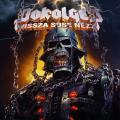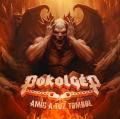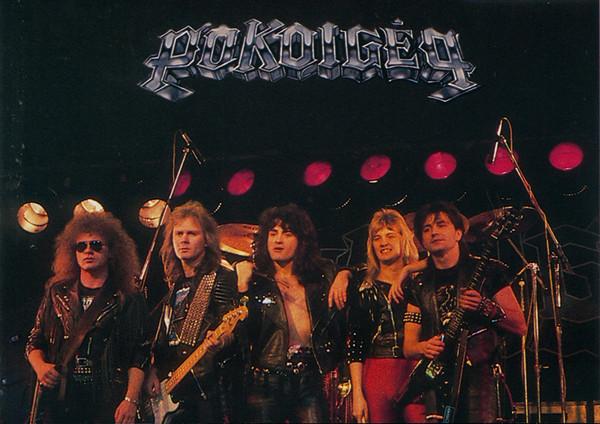In the late 1970s, three young men decided to make music just for their own fun and the enjoyment of others. They were Gábor Kukovecz, Endre Paksi and Tibor Varga. They decided to give the band the name "Pokolgép" (literally means Infernal Machine, but is the Hungarian word for a home-made bomb). Kukovecz was taught to play the guitar by Prognózis fame István Vörös, who suggested a less offending name to them ("Kommandó"). They used it for some months, then returned to Pokolgép. The life of the band was very difficult because of their poverty and the government's negative aspect of the band. They were playing half-illegal concerts in the edge of Budapest, and after some time they became known. They had several dozens of drum players, and also a lot of guitarists, until they found László Nagyfi for playing the second guitar. In 1985, Paksi left the band due to personal conflicts (he couldn't agree with Kukovecz on the leading of the band), and György Pazdera arrived to the bass guitar. Some months later, the drummer András Gyenizse emigrated to the USA, so Pazdera invited his old friend László Tarcza.
In 1983 the band placed runner-up in Ki Mit Tud (a talent-searching festival which was directed by the communist government), so they could record a song ("Kegyetlen asszony") which was released on a split 7" single. They also recorded two songs in the Hungarian Radio in 1984 ("Cirkusz és rács" and "A bűn"). In 1985 they recorded and released their first own disc, which was a single with two songs ("A Sátán" and "A maszk").
The first albums:
A very special thing happened in 1986: the government allowed Hungaroton to release the first heavy metal album in Hungary. This was the debut album of Pokolgép, titled Totális Metal. This was the time heavy metal bands started to come to the Eastern bloc (e.g. Iron Maiden and Queen), mainly to Poland and Hungary. Pokolgép played before Metallica and Motörhead in the late 1980s. In 1987 Pokolgép released their second album, Pokoli színjáték. These two are considered to be the base of Hungarian heavy metal. The interesting fact of Pokoli színjáték is that it was firstly played in concert, and released days after.
In 1988-89, Pokolgép went for a tour in Europe, playing in the two German states, the Netherlands and Belgium, and released their third album in 1989 (title: Éjszakai bevetés). They recorded a concert at the end of 1989 in Petőfi Hall, and then released as the fifth album in 1990 with the title "Koncertlemez". Before releaseing the concert audio footage, they made their fourth album, "Metál az ész". This album was made in a rather bad atmosphere, as guitarist Nagyfi and vocalist Kalapács were about to quit the band.
Member switches
Nagyfi said in an interview that Kukovecz and he weren't agreed with the style of music to be played. Nagyfi said he liked the rawer, more impulsive and speedy songs, while Kukovecz liked the solos and melodies. This was the reason he left with Kalapács and formed Omen. So there were only three Pokolgép members: Tarcza, Pazdera and Kukovecz. They started to look for a new second guitarist, who became Péter Kun, but he was taken away after half a year to Edda művek. The vocalist became József Rudán from a Led Zeppelin tribute band, Coda.
Controversy:
On 27 December 1987 a 15 years old young man Lajos "Szőrme" Varga suffered a very severe accident during the Metál Karácsony festival held in the Petőfi Csarnok event hall. A pyrotechnic device exploded and pieces of it hit Szőrme's head causing a dramatic injury. Szőrme's head almost collapsed into two pieces, his corpus callosum was cut by the pyrotechnic device. He was for three months in chomatic stage and he died for several times but medical doctors saved his life. The rock band Pokolgép still denies their responsibility for this accident. Szőrme is not able to work and to establish proper social contacts, however his mental capacity is still on over average level.
Ex-members:
Vocals:
Rudán Joe (1990-2010)
Kalapács József (1982–1990)
Németh László (1982)
Paksi Endre (1980–1982)
Guitars:
Nagy Dávid (2001–2010)
Láris László (1999)
Jung Norbert (1991–1994)
Kun Péter (1990)
Nagyfi László (1984–1990)
Révi József
Maza István
Bass:
Pazdera György (1983–1994)
Paksi Endre (1980–1983)
Drums:
Czébely Csaba (2006-2010)
Szilágyi Ede (1999–2006)
Tarcza László (1985–1994)
Gyenizse András (1983–1985)
Neográdhy Dezső (1980–1983)
Keyboards:
Varga Tibor (1980–1982)
 Albums
Albums Description
Description





 11
11 6
6
Thank You!
köszönöm szépen...
Thank you so much!
Thank You
Köszönöm
waaaw

Many thanks !!!!
Muito obrigado!
Köszi. Egy igazán jó Magyar metal zenekar.